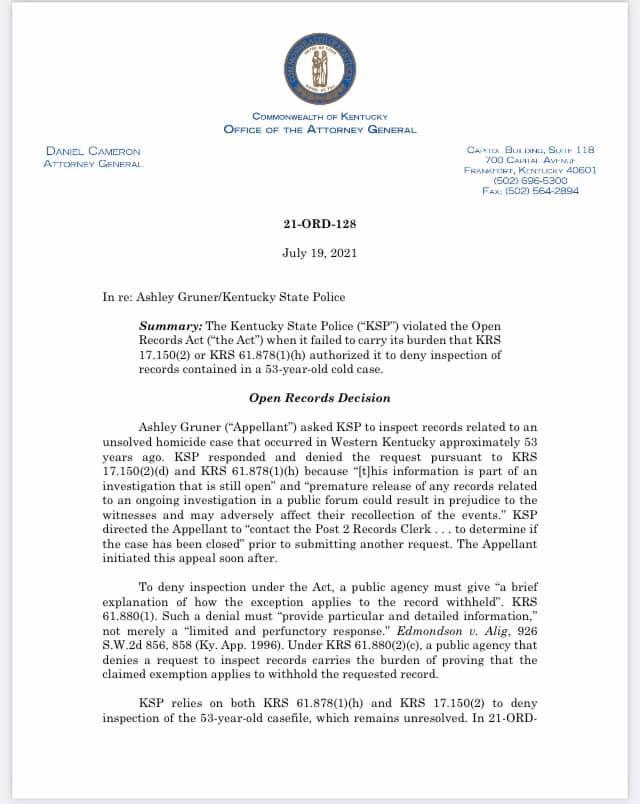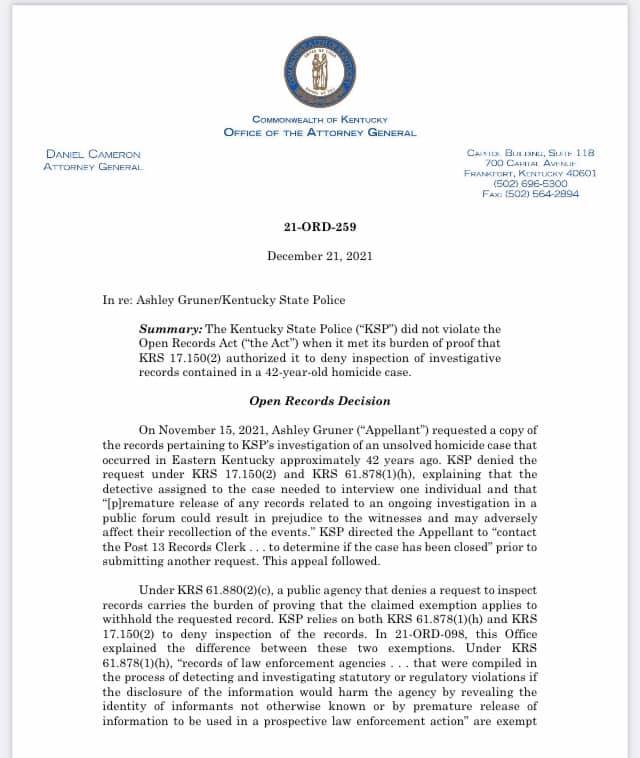

On July 19, the Kentucky Attorney General issued an open records decision determining that the Kentucky State Police "violated the Open Records Act when it failed to carry its burden that KRS 17.150(2) or KRS 61.878(1)(h) authorized it to deny inspection of records contained in a 53-year-old cold case."
https://ag.ky.gov/Resources/orom/2021/21-ORD-128.pdf
KSP initially asserted:
"This information is part of an investigation that is still open. Premature release of any records related to an ongoing investigation in a public forum could result in prejudice to the witnesses and may adversely affect their recollection of the events."
KSP directed the requester to "contact the Post 2 Records Clerk . . . to determine if the case has been closed' prior to submitting another request."
On appeal, the Attorney General rejected KSP's argument, reasoning:
"It is unclear from this record whether KSP has identified a suspect, or if any suspect still survives. Given the fact that 53 years have passed since this case began, 'KSP's incredibly vague, speculative, and remote concerns under the circumstances of the case [are] unreasonable.'"
On December 21, the Attorney General issued an open records decision determining that the Kentucky State Police did not violate the Open Records Act when it met its burden of proof that KRS 17.150(2) authorized KSP to deny inspection of investigative records contained in a 42-year-old homicide case.
https://ag.ky.gov/Resources/orom/2021/21-ORD-259.pdf
KSP initially asserted:
"Premature release of any records related to an ongoing investigation in a public forum could result in prejudice to the witnesses and may adversely affect their recollection of the events."
KSP directed the requester to "contact the Post 13 Records Clerk . . . to determine if the case has been closed' prior to submitting another request."
On appeal to the Attorney General, KSP supplemented it's denial, arguing that "the detective assigned to the case is actively seeking a suspect whose name was 'referenced in a prior interview' and 'anticipates being able to locate this individual and interview him during the next couple of weeks,' and that "disclosure of any investigative records could assist [the suspect] in creating an alibi or evading arrest."
The Attorney General affirmed KSP's denial, reasoning:
"Although 42 years have passed since the crime occurred, the facts in the record on appeal support KSP's claim that investigation of this case has not concluded. KSP is pursuing an identified suspect whom it expects to locate and interview in a matter of weeks. Thus, this is not a case in which 'a de facto decision not to prosecute has been made by the passage of time.' Accordingly, KSP did not violate the Act when it withheld the investigative records in this case."
The Attorney General distinguished the July decision involving a 53-year-old investigation where no suspect was identified from the December decision involving a 42-year-old investigation based on KSP's supplemental claim that a suspect has been identified.
These open records decisions confirm three things: that KSP continues to treat an investigative file as a single record no part of which can be disclosed if any part may legitimately be withheld and that it continues to issue boilerplate denials to records requests in contravention of University of Kentucky v The Kernel Press, Inc. It also confirms that, when challenged, it rarely repeats its past mistakes — here, asserting the existence of a suspect in a 42-year-old unsolved homicide to secure a favorable ruling.
